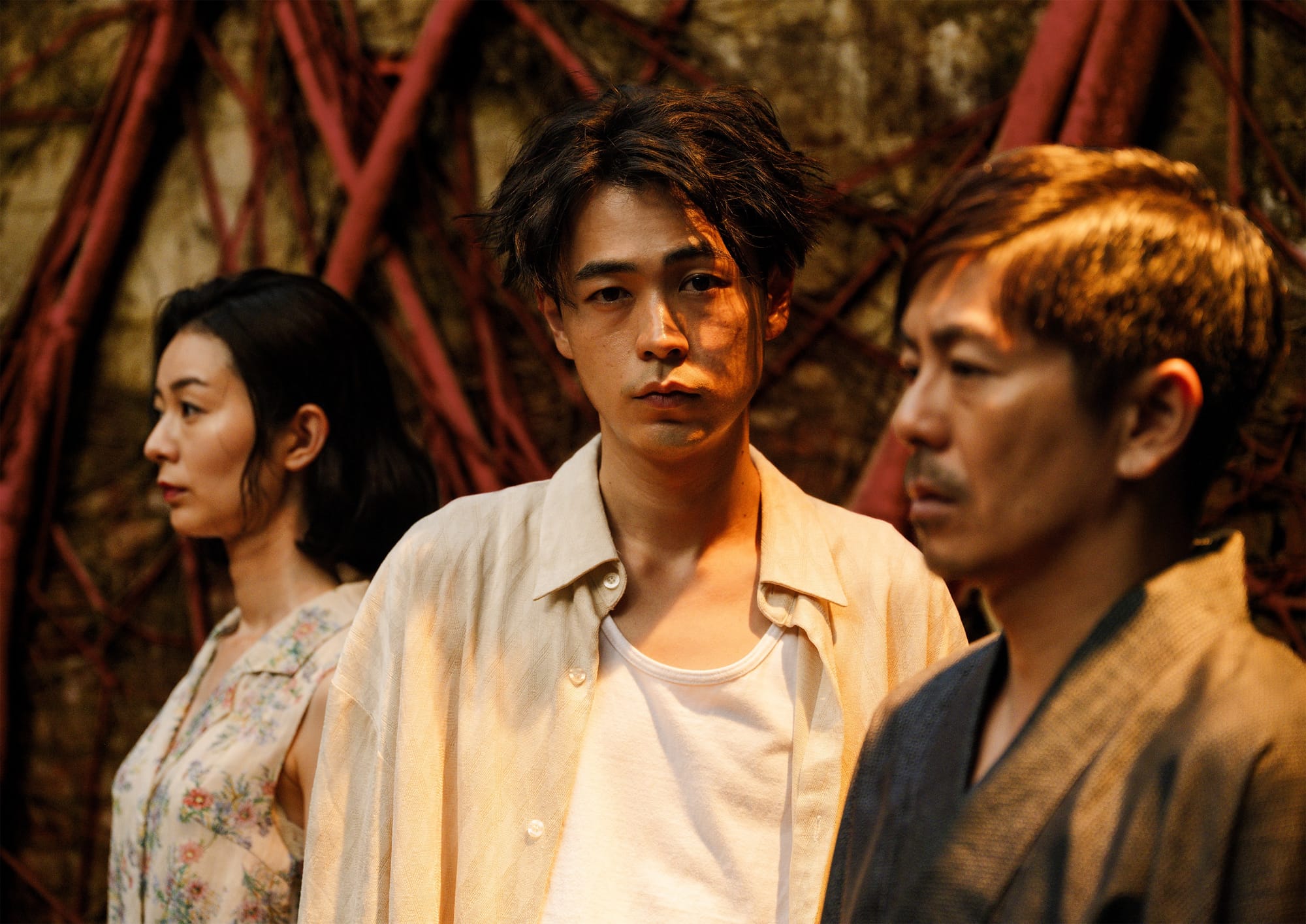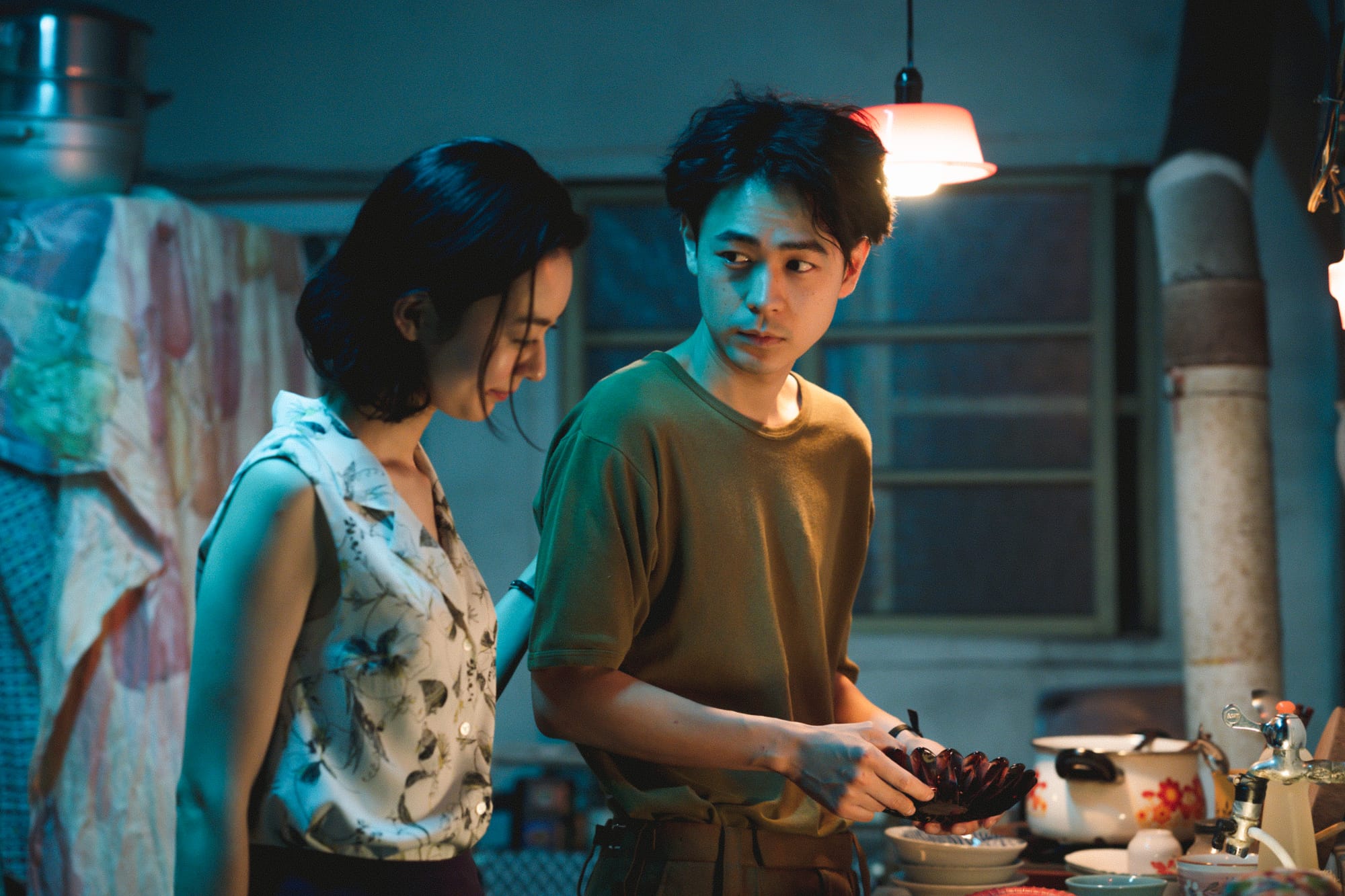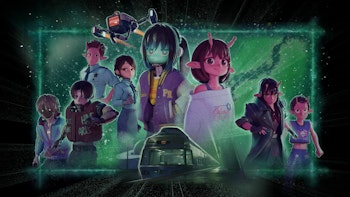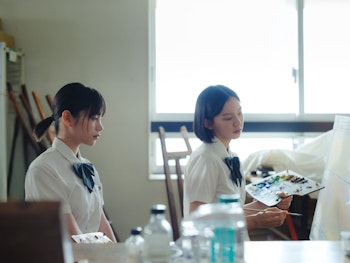
Lust in the Rain had perhaps the most visceral opening sequence of any film at this year’s Tokyo International Film Festival.
Set during the at-times unreliable ahistory driven by its equally-unreliable protagonist and guide Yoshio (Ryo Narita), this is a sexual, violent, esoteric and at-times profound journey of ideas about Japan at war in the 1940s that jumps so wildly between realities that it can often feel difficult to discern real from fake. Yet this same confusion that could fall under the weight of its own ambition in other hands has taken the autobiographical source material of four stories by mangaka Yoshiharu Tsuge and transformed it into something strange and yet moving and profound.
That opening, however, sets the tone of the film to come. In the pouring rain and claps of thunder and lightning, hidden under a metal bus stop, Yoshio and a frightened young women are sheltering underneath its cramped canopy. “It’s metal,” he warns, “so we must remove clothing and metal items that could attract lightning.” This ever-degrading cycle leaves both parties naked under the canopy, and after it catches fire, Yoshio and the girl run, before he chases the woman into a field and rapes her.
Seemingly from nowhere we jump to a town, where we stay for much of the opening half as a love-triangle between the aspiring manga artist Yoshio, an older novelist named Imori (Go Morita) alongside a woman named Fukuko (Eriko Nakamura) with her own shady past. We meander as they try to start a magazine, scam strangers and each others, have sex in a way that seems meaningless, but never loses a sense of unease and dread.
It’s the little moments that keep you unable to look away. Yoshio's manga is a portal for his depraved sexual fantasies that come to life in the opening scene, or in peeping at the others having sex through a hole in the wall. The eyes never averting their gaze, whether real or hand-illustrated and plastered on the walls of his office. The people around us seem both aware of their depraved acts and yet unable or unwilling to challenge them. Indeed, some almost seem scared, without clear provocation to be feeling such a way.
In one of the more visceral moments seemingly calling back to the opening scene, another fantasy sees Yoshio follow a girl down alleys until so suddenly she’s hit, rather ahistorically, by a car. Not just hit, launched and catapulted almost cartoonishly for hundreds of meters, flipping through the air before her corpse unceremoniously flops into another rice field. He defiles her corpse briefly following.
This is far from a comfortable watch for its explicit and violent depravity alone, but it’s something impossible to look away from. The taboo, deliberately obfuscating what is real and what is not, is horrifying to watch yet, just like our protagonist, infatuates us because it is so heinous, so wrong, yet so tempting. You feel dirty, yet you feel like you’re immersed in the corridors of a disturbed man.

It’s at-times meandering, overstaying its welcome and going too far into the realm of absurd it pushes you away in its confusion, yet inevitably you get wrapped in its impossible web. As it takes a step back, layers of the truth are unveiled, most notably in its setting. The fluidity and lack of clarity on its setting gave us a free look into the mind divorced from a state of place that could bring context to these acts, but as scenes of war and terror slowly enter our psyche, it soon becomes clear. This is 1940s Manchuria.
While to dive much further would pull back the curtain on this film to a detrimental extent, this unveiling is the turning point that elevates and contextualizes everything before and to come. The exploits of Yoshio, awful and yet so divorced from reality by their lack of place and space its hard to internalize their horror, take on a far more sinister turn when you begin to consider who has the power and fate of the people involved. Whereas unreliable narration made it hard to penetrate the truth behind the web of mysteries and divorced violent rape and voyeurism into the realm of fantasy, this revelation thrusts these acts horrifically into an imperial-colonialist reality.
Even seemingly innocent acts get intimately tied into a harrowing critique of Japanese actions and war crimes that have yet to be addressed. It’s an abstraction of massacre and violence that becomes both more explicit and more abstract as we learn this fact, and at its most bleak, at the moment where it’s hardest to understand what reality even is anymore, the truth is the only thing we have left to grasp.
This is not going to be for everyone. Beyond its messy structure making it a difficult film to process and connect with, never mind its source material that even makes its most prescient and profound moments a challenging pill to swallow, the film often obfuscates itself that even by the credits an audience convinced by its approach and channeling an anti-war sentiment through a lens into World War II will fully be on the same page as its director. There’s a scale, especially in later moments, that can sometimes obfuscate the heart and characters that serve as our anchor through this hazy sea of visions and pain.

Never mind all that, its self-centered, explicit approach to this message, while in keeping with the original manga, is not designed to appeal to the sensibilities of all and can feel at-times paradoxical. This, in my opinion, is what actually helps tie this cavalcade of ideas into something whole, weaponizing its contradictions until only the through line is left for an audience to cling onto. But that audience has to stick around for long enough to reach out for that thread in the first place, and not everyone will.
It’s worth doing. For all its challenges, there’s few films that can stand alongside Lust in the Rain for having such a singular vision in recent years and committing to it at such a scale. As a technical piece of cinema it soars, showcasing a wealth of experience and craft from Shinzo Katayama, a director growing in prominence. Within five years he has stepped up to the director’s chair and channeled his early-career experience as an assistant director to Bong Joon-Ho to achieve award-winning success with his 2022 hit movie Missing and his Disney+ original series Gannibal, all while creating a new project with this film that arguably surpasses both of them.
It educates on a history that is certainly not discussed enough in Japan and is at risk of becoming a memory without the lessons and reparations being reciprocated, and it takes stories that are as visceral and confrontational as this for the ignorant and uninformed to sit up and take notice. Perhaps even make a difference. You certainly won’t forget about it in a hurry, anyhow.










